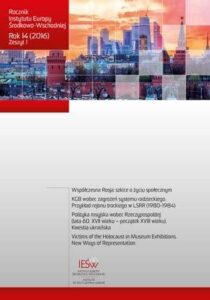ORCID: Michał Stanisław Jasiński:
Pages: 93-117
Edition: Lublin 2016
DOI: --
Citation method: M. S. Jasiński, Cztery dekady prawosławia. Warszawska parafia pounicka w strukturach Patriarchatu Moskiewskiego w latach 1876-1917, „Rocznik Instytutu Europy Środkowo-Wschodniej”, 14 (2016), z. 2, s. 93-117.
Abstract:
Four Decades of Orthodoxy. The Former Eastern Catholic Parish in Warsaw under the Moscow Patriarchate, 1876-1917 is an attempt to reconstruct the history of the Warsaw-based church and community of ex-Uniates following their absorption into Russian Orthodoxy. It starts with a brief historical account on the formation of this group initiated by the Basilian Order. Then it describes the Russian policy that removed the Basilians from the parish. It goes over the process of adapting the parish to Orthodoxy in terms of architecture, area, demography, staffing and ideology. It discusses the parish clergy in terms of social and geo-ethnic backgrounds, education and worldviews. It lists the most active parishioners, i.e. Russians belonging to the city’s military and executive elite. The most significant episodes of the Orthodox parish are enumerated, i.e. the involvement of the parish priest in the 1882 Hnylychky controversy, the 1892 failed bomb attack on Governor-General Iosif Gurko, and the 1906 political murder of an agent provocateur, son of the parish priest. Some thought is given to the 1905 Edict of Toleration that did not result in giving former Greek Catholics back their confiscated Warsaw church. The narrative ends with the evacuation of the Orthodox clergy in the summer of 1915, followed by the entry of German troops into the city, and the official act of handing over the church to its original owners, i.e. a group of now-restored Greek Catholics and a Basilian Father, thus concluding the Orthodox period of the parish.

PDF: Download